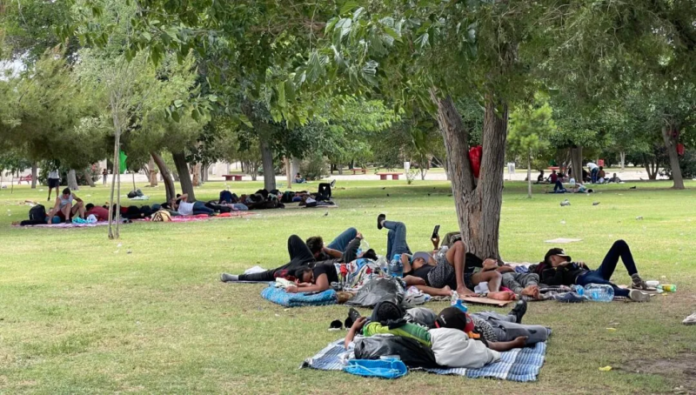Abstract
The Chamizal Park in Juarez, Mexico has become the new home for Venezuelan refugees awaiting asylum in the U.S. Post the repeal of Title 42, these migrants face disarray, risk, and misinformation, struggling to navigate the legal channels of migration.
In the shadow of towering trees at Chamizal Park, Juarez, a drama unfolds that is as heartbreaking as it is daunting. Venezuelan migrants, their numbers swelling day by day, are staking out a hardscrabble existence, their hopes pinned on an elusive American dream. The majority of these asylum seekers, fleeing the clutches of a ruthless dictatorship back home, have laid claim to the grounds of this park, their eyes set on the Bridge of the Americas international crossing, their gateway to a life of freedom.
This makeshift camp is their purgatory, where they bide their time, sometimes bypassing the formal appointment system to cross the border. Amidst a sea of blankets spread over the grassy fields, you can hear hushed whispers of plans to cross without an appointment, of lists being made, and groups being formed. The story of José Gregorio, a 42-year-old Venezuelan awaiting his turn to cross the bridge with his wife, mirrors the desperate hopes of many others at the camp.
Local vendors and bystanders have been witnesses to this growing congregation of displaced people, their curiosity piqued by the sudden influx of migrants. With a significant number of these refugees being from Venezuela, the demographic make-up of the park is rapidly changing, the majority of new faces belonging to men, women, and unaccompanied minors from the troubled South American nation.
This narrative takes an ironic twist as it unfolds just weeks after Juarez municipal officials evicted migrants from the city hall vicinity. The end of Title 42, a pandemic-era policy that denied asylum seekers the chance to present their cases, has set the stage for a transition to the immigration laws under Title 8. This shift in policy has triggered a domino effect, leading to the formation of new camps like the one at Chamizal Park.
Cristina Coronado, a coordinator at the Office of Mobility and a soup kitchen operator in Ciudad Juárez, paints a grim picture of the situation. According to her, the migrants arrive in Juarez, confused and misled by cartels and coyotes who continue to spread misinformation about border policies. This risky gamble is putting the lives of these migrants in peril, as they put their faith in unverified sources.
The Border Patrol and Customs and Border Protection officials have a clear message for those who seek to migrate – stick to the legal channels and avoid the hazards of irregular migration. The CBP One mobile app has been highlighted as the right way to navigate the process, an assurance that falls on the anxious ears of those desperate to cross the border.
Yet, amid the chaos and uncertainty, the U.S. Department of Homeland Security brings a glimmer of hope. The number of migrant encounters has seen a significant decrease since the repeal of Title 42, a small but promising step towards streamlining the process.
In conclusion, the situation at Chamizal Park underscores the plight of Venezuelan migrants caught in the whirlwind of political policies, misinformation, and the overwhelming desire for a better life.









